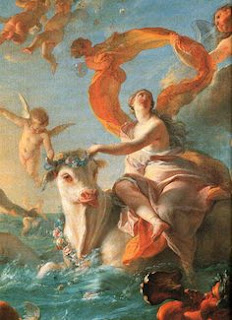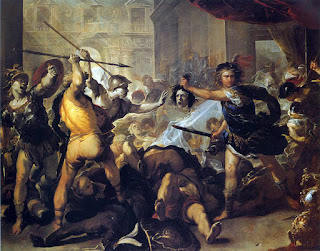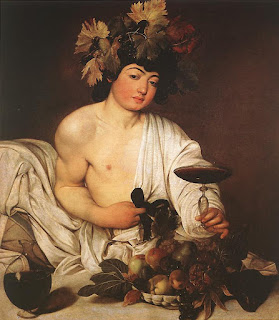Book III
Cadmus / Actaeon / Semele / Tiresias / Narcissus & Echo / Pentheus
Agenor commands Cadmus to find his sister, Europa, yet while he wanders near and far, success eludes him, until the oracle of Apollo tells him to find a heifer who has never worn a yoke and there in Boeotia, he is to build his city, Thebes. Cadmus kills a serpent and under Minerva’s orders, plants its teeth from which spring men, but warriors that, in their battle frenzy, kill each other until there are only five left: Echion and four others. Together they build the walls of Thebes.
Cadmus’ first sorrow lay in his grandson, Actaeon, who when out hunting with his friends, came across Diana bathing in a pool, and for having viewed the sacred virgin, Actaeon is transformed into a stag by the goddess. Yet the goddess is not satisfied with such a benign punishment, he is hunted by his own hunting dogs until,
“Upon all side, his hounds have hemmed him in;
they sink their muzzles into every limb —
the flesh of their own master in false guise
as stag. Diana was not satisfied
until, so mangled, young Actaeon died …”
Thus, Juno’s rage against Europa, and all her blood, stemming from the house of Agenor, is assuaged.
 |
Jove and Semele (1695)
Sebastiano Ricci
source Wikipedia |
Juno learns that Cadmus’ daughter, Semele, is pregnant by Jove and, seeking revenge, she disguises herself as the girl’s nurse and counsels her to ask Jove to see him in all his powers. Unsuspecting, Semele makes this request of her lover and, unable to refuse her, she is killed by his bolts of light and turned to ash. However, her unborn son, Bacchus, is rescued, sewen into the thigh of Jove and then given to Nysan nymphs upon his birth.
To settle an argument over whether men or women get more pleasure in love, Jove and Juno defer to Tiresias, who knew love as both genders (having been transformed by mating serpents to a woman and back again). Furious at Tiresias siding with Jove, Juno steals away his sight, and Jove gives him the gift of prophecy for recompense.
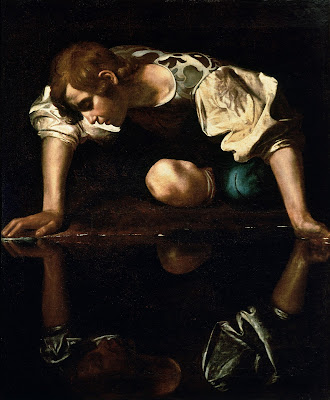 |
Narcissus (1594-96)
Caravaggio
source Wikipedia |
Asked by the river nymph, Liriope, if her son, Narcissus, would live to see a long life, Tiresias’ answer “Yes, if he never knows himself,” was a cryptic puzzle. Yet the boy, loved by youths and girls alike, has a disdain for them all, including a nymph, named Echo, whom he spurns, and she wastes away until only her voice remains. Finally, a youth prays to the gods that Narcissus receive the same treatment as they, and one day, as he sees his reflection in a pool, he immediately falls in love.
” … he is the seeker and
the sought, the longed-for and the one who longs;
he is the arsonist — and is the scorched.”
He pines away, as had Echo, and eventually dies, but instead of a body, only a white-petalled flower with a yellow centre remains.
Tiresias’ reputation grows but, Pentheus, Echion’s son, mocks Tiresias and his blindness, as he also scorns all the gods, especially refusing the rites of Bacchus. The old man prophesies that Bacchus will soon come and if Pentheus does not accept him, he will be torn to pieces.
” ……………………. and then
you will complain that, in my blindness, I
saw far too well.”
Bacchus arrives and Pentheus is in a fury not even his grandfather, Cadmon, can assuage. He captures a priest of Bacchus, Acoetes, who tells of his encounter with a young Bacchus on a ship, and of his god-like appearance. When all the crew but Acoetes refused to take Bacchus to his destination, they were all turned into sea-monsters. Enraged by the story, Pentheus finds the revellers on Mount Cithaeron, but tragically his mother is the first to see him. Claiming that he is a boar, she incites her sisters to tear him to pieces, ripping off his head with her own hands.
Note: Tiresias also dispenses his prophecies in Sophocles, Antigone, Oedipus the King, and in The Odyssey Book XI.
❄ ❄ ❄ ❄ ❄ ❄ ❄ ❄ ❄ ❄ ❄ ❄ ❄ ❄ ❄ ❄ ❄ ❄ ❄ ❄ ❄ ❄
I’m noticing quite a bit of irony in this book: Cadmus’ warrior’s instead of killing an enemy, kill each other; Actaeon, the hunter, becomes the hunted; Semele is killed by the power/love of her lover, and in fact, unknowingly requests her own death; Narcissus rejects all, yet in the end also rejects himself; Tiresias’ knowledge causes his blindness; Pentheus, through rejecting sacred rites, becomes a sacrifice himself, and Pentheus’ mother kills her own son. Ovid’s world is very bleak, and he ensures that we experience it to the fullest.
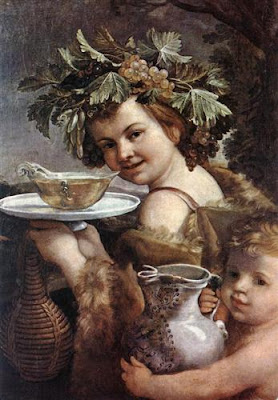 |
The Boy Bacchus (1615)
Guido Reni
source Wikiart |
Metamorphoses
Viper’s Teeth ❥ New men
Actaeon ❥ Stag
Semele ❥ Ash
Echo = nymph w/voice ❥ nymph w/echo ❥ echo
Narcissus alive ❥ Narcissus dead ❥ flower
Ship’s crew ❥ Sea monsters


